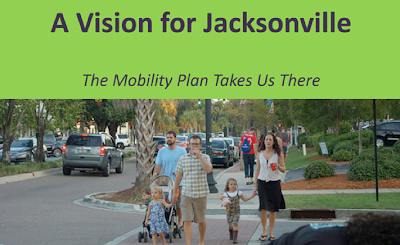Well folks, it looks like City Council is in bed with developers... again.
To give you a quick run-down of what's going on right now, here's a quick history of the Mobility Plan and the fee this post is talking about:
- In 2009, Jacksonville adopted the 2030 Mobility Plan which would make developers pay a nominal, specific transportation fee when developing land away from our city center, with more fees being charged the farther they develop from the urban core. When adopted, the plan was hailed for being a smart way for our sprawl-laden city to move forward and encourage positive, more dense growth. The Mobility Fees go toward pedestrian, bike, and mass transit development-- sidewalks, bus stops, bike lanes, and the like. Included in the 2030 Mobility Plan are specific bike/ped/mass transit projects that would be funded with these moneys by 2030, if fees are collected as expected.
- Mobility fees were put on hold with a Mobility Fee Moratorium in September of 2011, with a bill passed by City Council. The logic here was that the fees assessed for Mobility put too much of a strain on, and spurred development and job growth. The introduction of this Moratorium was sudden, and didn't give the public much time for input.
- The Mobility Fee Moratorium ended in October 2012, and much rejoicing occurred among bike/ped/mass transit activists all around!
- A few City Council members have expressed during council meetings that they believe that imposing a fee on developers spurs economic and job growth.
- There is no study in existence that shows that the Mobility Fee Moratorium created economic growth or jobs. If I am wrong, and there is one, please let me know!
- Pedestrian and bicycle related improvements create MORE jobs than road projects. According to a study titled Estimating the Employments of Pedestrian, Bicycle, and Road Infrastructure "pedestrian and bicycle infrastructure projects create 11-14 jobs per $1 million of spending while road infrastructure projects create approximately 7 jobs per $1 million of expenditures." If we can get the mobility fee into effect and start working on backed up bike/ped/mass transit projects, more people will get jobs.
- Despite the fact that Jacksonville is the epitome of sprawl, there is a growing amount of interest in getting around by walking, biking, or by bus- and the interest is not just because of gas prices.
- As evidenced by the number of people who spoke at last week's city council meeting, there is a great amount of local interest in moving about the city by ANY OTHER MEANS than in a car. Studies show that fewer of todays young people in the US are obtaining drivers licenses, and more are interested in living in high density urban neighborhoods that are walkable and bike-able. Ridership of our Skyway is up. JTA bus ridership continues to grow as well.
- We have many empty shopping centers and dwellings that could be put to use, yet it's argued by developers that it's cheaper to build on undeveloped land away from the urban core. In a time when our city is turning off streetlights to save money, it might be a good time to investigate reusing some of our older, empty buildings that have existing city services attached-- water, electric, street lights (people!), as well as sidewalks and bus stops. The Mobility Fee is meant to encourage infill development, which is what Jacksonville's wallet (not to mention, Florida's precious, beautiful land) needs right now.
- Write to your city council member and let them know you are opposed to the 3-year mobility fee moratorium.
- Come to the next City Council meeting on February 26th at 5:00PM, 117 W. Duval St. Jacksonville, FL 32202. Feel free to fill out a comment card stating you're opposed to the 3-year mobility fee moratorium or prepare a short, to the point 3-minute or less speech.


2 comments:
In case anyone needs ideas of what to say, here's the text of the email I sent to my councilmen:
It has come to my attention that a bill has been introduced to put a 3 year moratorium on the mobility fee charged to developers based on location of development projects. As I understand it, this fee serves 2 purposes: It funds mass transit, walking and bicycling improvements in our community and it discourages continued sprawl.
While I understand that many developers would be opposed to such fees, as a 38 year resident of Arlington, I feel that it is in our community's best interest to encourage government and private reinvestment in existing infrastructure and neighborhoods. This would provide both better quality of life and more jobs for your current constituency.
Please do not overlook the needs of our community.
Thank you,
David Fletcher
Thank you for the email text, David! I think many people ended up emailing in, and I get the impression that City Council is listening.
Post a Comment